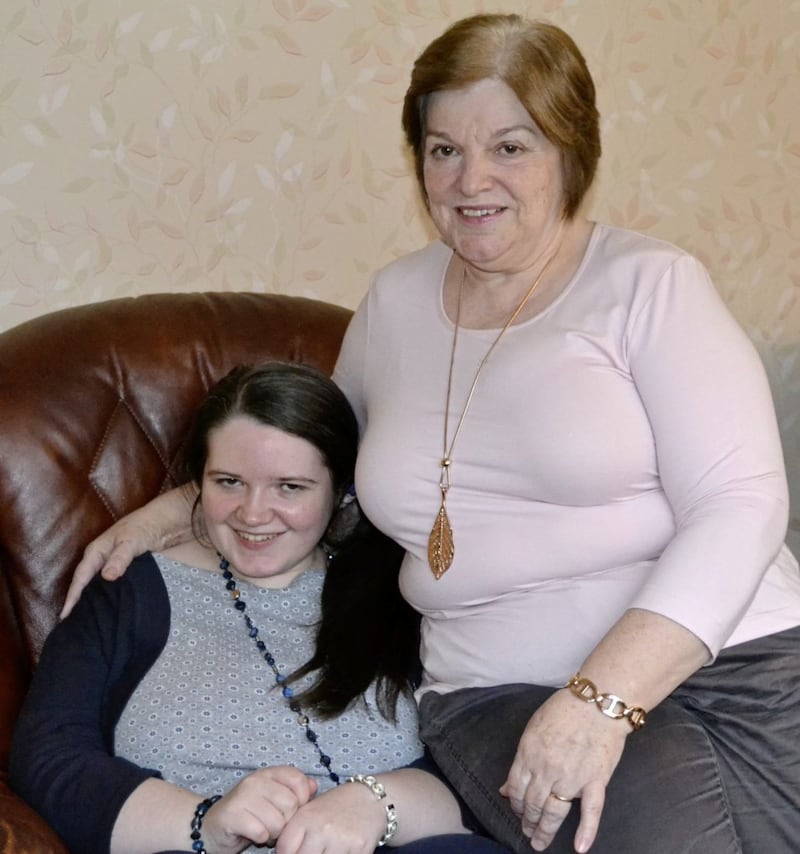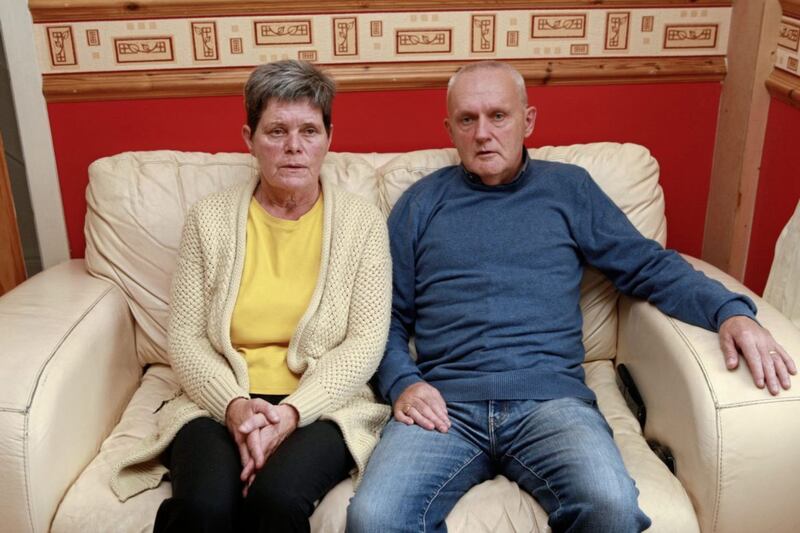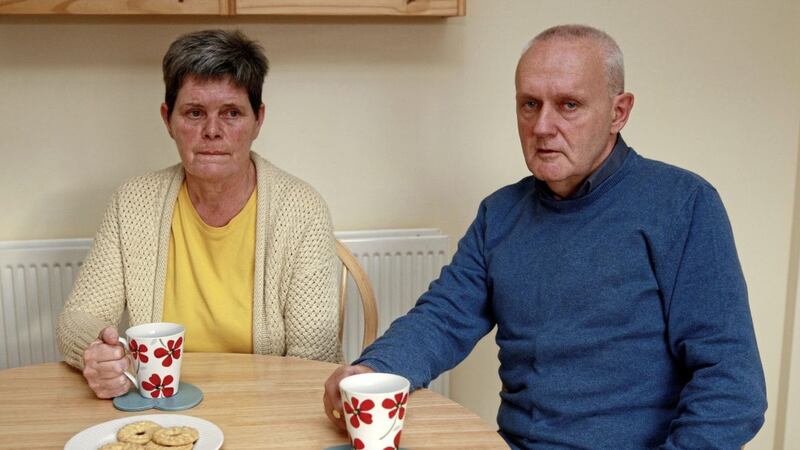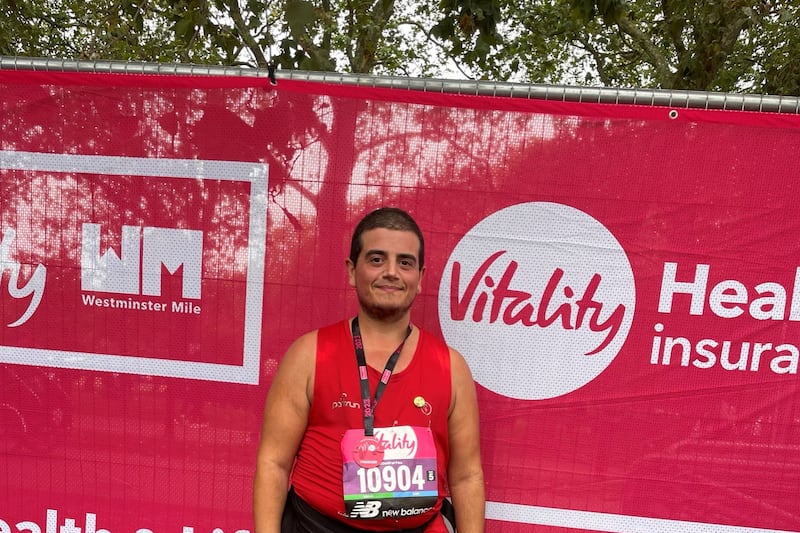AFTER almost a quarter of a century together Raymond and Ann Larmour made the painful decision to separate.
The couple love each other as much as ever, but staying together had become too just too difficult.
"We've been with each other 24 years. We've decided today that we're going to separate and get some respite. I'm 60 in January and my wife is 59 on December 1," Raymond said.
More than two decades caring for their adored son Ryan who has Aspergers Syndrome, Attention Deficit Hyperactivity Disorder and moderate learning difficulties had taken its toll.
He is the centre of their world and their devotion to him is evident.
As a teenager, a depressed and isolated Ryan would self-harm. Determined to give him a positive focus, his Co Tyrone father tapped into his love of hip hop to try and lift his spirits.
"I would sit and write the songs," he recalled.
"Every line I would write down, I would ask him what he thought of it. He would think of a lock of lines himself. When he would really like something he would do a wee skip up and down the room."
The pair downloaded beats from the internet and went to a studio to record the resulting songs. Ryan even had a slick video produced which briefly became a YouTube sensation.
Raymond, would "go knock all the doors round Omagh, Mid Ulster, as far as Newry and sell them for £1 to raise funds for autism charities that had helped Ryan over the years".
"He (Ryan) raised nearly £12,000 for three charities. We have certificates of appreciation framed in the hall."
Such stories of dedication are familiar from parents with off-spring on the autistic spectrum.
Pensioners Audrey and John Junkin from Portglenone, Co Antrim worry about what the future holds for both them and their 26-year-old daughter Leah.
Leah has Autism Spectrum Disorder, severe learning difficulties and epilepsy.
When she was 13, during a difficult period for the family, her parents were allocated 24 nights of respite a year, when she goes into residential care.
They are offered in two or three night clusters, "the most would be four nights".
"It's when they can slot her in, not really our choice," Audrey said.
"It means you can't really do anything with the days, like book a holiday or a dinner because you don't know when it's going to be. You can't plan.
"There has been no increase in those as she's got older and we've got older and needed more help."
Now 62 and retired, she says "we do find things a bit more challenging and I have to think twice before I buy things".

"She doesn't suffer, for she comes first, but we're less able to cope with Leah's needs. She's a young woman who's wanting to participate in things even though she's not very competent. She's wanting to got to the gym and the cinema and not with `mummy'.
"She wants to feel she has friends like ordinary people."
There is also the frustration of not being able to enjoy the kind of retirement they have worked all their lives towards.
"You hear friends talking about the exotic place they have gone or just having a lovely evening out. That would be nice.
"And when we talk about life with Leah you feel people don't want to hear about it anymore, but that's our life. They're talking about their lives, this is our life."
When Leah was 13, Audrey began to worry about her future and put her name down for a supported living place when she became and adult.
Last year, she discovered Leah had never been on a waiting list at all.
Audrey said she was told there is only "crisis management" at present, because of budget pressures and worries that if the family should find themselves in difficulties Leah will not be prepared for a sudden change to her living conditions.
"I would like to see Leah being phased in to where she was going to live. It took her six months to come round to me being retired, understand it and accept it. She needs a lot of time to get used to change."
She said the support for autistic minors seems to end abruptly when they reach adulthood.
"We were happy with the help Leah was getting. It all stopped then in adult services. There was a new battle again and the whole thing goes round in a circle again.
"The thing is, there's a lot of provision for children and nothing for adults."

Jason Rigby is no stranger to that frustration.
The father of strapping 21-year-old James, whose condition is non-verbal, he has had to fight hard to get him the home he now lives in happily and securely with the support from two full-time carers.
"In children's services you get used to the quality of service and the transition into adult services is very, very mixed.
"Certainly in our experience we've had to negotiate our way through. We didn't know who did what, there didn't appear to be an adequate idea of what his needs were.
"From a parental perspective we didn't know what was going to come next. There was one big deadline and that was when he turned 18. You know that's coming but you don't know what will happen after that. There was an awful lot of chasing with the health trust."
The first supported living placement did not work out for James and the anxiety that caused led to distressed behaviour.
His new placement, through Autism Initiatives (AI), has been transformative.
"Part of his assessment with AI identified that it wouldn't work out if he was sharing a house and he ended up getting a residency of his own house with two to one care.
"His world has expanded. He has a motability car that travels with James. At home I would have take him out for walks but the car broadens the range of activities James can do. He loves getting out of the house.
"They understand him and can cater individually for him with activities that stretch him.
"You never stop being paranoid as a parent but I know where he is now he is safe and he is happy."
For the Larmours, this summer, things reached crisis point.
The dark-haired 22-year-old standing at six-foot two and craving independence, Ryan had moved out of the family home and into a flat of his own in nearby Cookstown.
"He wanted to live on his own and you have to give things a go," Raymond said.
"Three or four times a day we are with him, but we had noticed him getting very hyper.
"There's been a lot of outbursts, they're getting more violent with frustration and anger and believing that he doesn't belong in this world and feeling rejection that comes along with his condition.
"Over 90 per cent of people have severe depression with their condition. They have outbursts and really can't help it.
On July 6, after one such outburst from a distressed Ryan and seeing their son "very unstable", his parents tried to get in touch with his dedicated mental health team, but were unable to talk to the person they needed to.
"We got the police, as we have done manys a time. They went to Ryan's house and arrested Ryan. We wanted him to be assessed and his doctor recommended he was committed to Holywell for assessment.
"But he was taken to Craigavon Hospital by police and deemed fit."
The next day Ryan appeared in court, which was told prosecutors were considering a case against him.
"He was remanded to keep him safe," Raymond said of the court appearance.
"He was very unstable."
His parents thought he would be in Maghaberry prison for "maybe a week", and had some idea of him getting a placement at a dedicated unit where his anxiety could be treated and he could return home.
Instead, four months later, a now desperate Ryan was still in the Co Antrim high security prison.
He was placed on the `vulnerable wing', Quoile House, which has 120 cells including dedicated areas for prisoners with mental health issues.
But, isolated from the security of his loving parents, Ryan's depression and anxiety is spiralling.
Raymond said key workers with the prison's mental health team can only do so much while he is in the alien environment.
"He said Ryan should not be there."
However, a move to a facility in Larne last month proved disastrous.
"They put a tag on him and there are sensory issue with autism so that really upset Ryan.
"He was also told he couldn't speak or contact his parents (for legal reasons). We were the only ones visiting Ryan in prison and bringing him down stuff.
"We texted him on a Thursday night `Good night son. Love you xx'.
"He (sent a message back saying) he felt like he was `their prisoner'. He couldn't understand why he couldn't speak to us."
In a cry for help familiar to those caring for people on the autism spectrum, Ryan set fire to some cushions in his room and was returned to Maghaberry.
There his behaviour has deteriorated further.
"He walks the floor talking to himself 24/7. A prisoner in the next cell told him to `f*** up', called him a psycho, grabbed him by the throat," Raymond said.
"We're so worried.
"Ryan's moustache curling away up, his beard is growing, his fingernails almost half an inch long, not cleaning his teeth, not washing."
Just a days earlier, Ryan had told his parents "he wanted to die".
"He said if he could just get a way of killing himself he would do it."
His parents are waiting for a court to decide if he he will be allowed to come home
When we speak again, Raymond and Ann have shelved plans to separate, determined to see it through together - even it means no respite for either of them.
"We'll always advocate for our son and be his voice when others won't listen to what he's saying," Raymond said.
"We feel our son has been badly let down over the years by social services, adult mental health services and now the justice system, who have shown little empathy."
A week later and Ryan is back home after a magistrate dismissed police opposition to jail and returned him to his parents.
"He said `prison is the last place this young man should be' and that lighting the cushions was a cry for help," Raymond said.
"He was walking his room, chatting and talking to himself all night the first night. But now he's sleeping again, 10, 11 hours a night."








